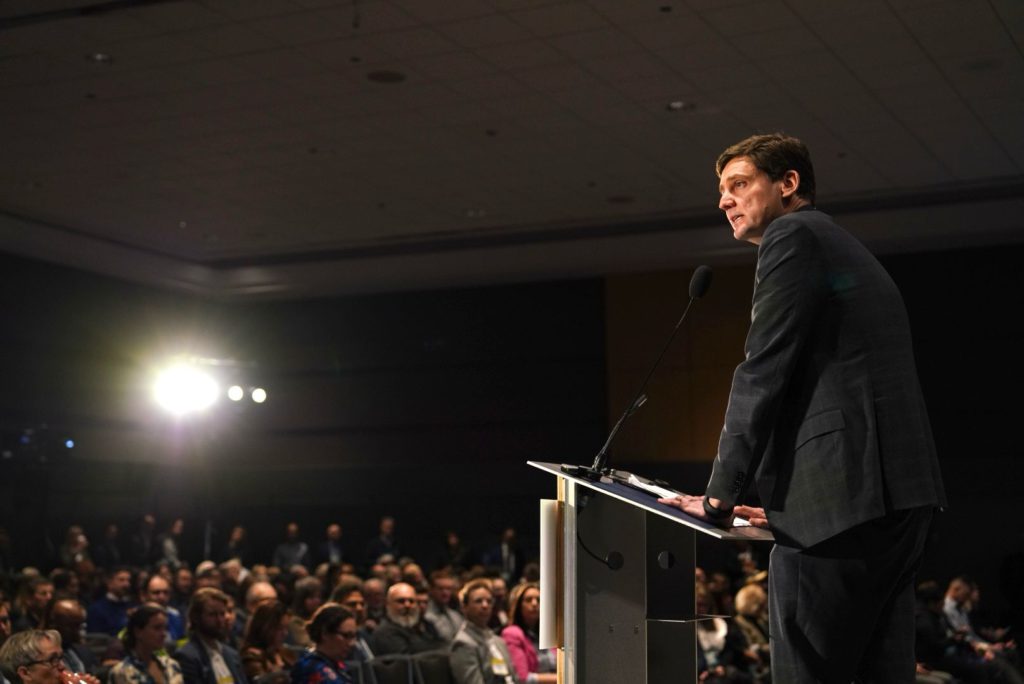British Columbia Premier walks tightrope between resource boom, green goals

British Columbia Premier David Eby sees a way for his province to exploit its abundant resources and proximity to Asia — without sacrificing environmental pledges core to his political platform.
In an interview with Bloomberg, Eby said he’s optimistic that LNG Canada, a massive new liquefied natural gas operation, can be expanded in a way that satisfies its investors but without supercharging the province’s emissions. He has also thrown his support behind other projects — including hydrogen production and an electric-vehicle battery recycling plant — to create jobs and keep BC’s economy growing at a challenging time.
Building on the natural resources industries that still dominate its economy — and outweigh its promising-but-smaller prospects like biotech — presents a tricky balancing act for Eby, whose governing New Democratic Party includes a strong environmentalist wing.
But the premier, who challenged the Trans Mountain oil pipeline and argued against expanding fossil-fuel infrastructure when he took office in 2022, sees a way to thread the needle.
For no project is that more important than the potential expansion of LNG Canada, which the federal government has said is worth about C$40 billion ($29 billion) in total investment. The development could deliver an economic jolt, but would expand hydrocarbon exports and require massive amounts of energy, complicating British Columbia’s vow to cut emissions 40% by 2030.
“We’ve made some pretty clear commitments around driving down emissions in the province, and we’re at a table with them about how we can try to achieve both of our goals,” Eby said about the investors behind LNG Canada. “From their perspective, ensuring that reliable, low-carbon energy, and from our perspective, all the emissions not showing up on BC’s books as the main producer.”
LNG Canada’s first phase is set to start supplying tankers to Asia in the next 12 months, producing as much as 14 million metric tons of LNG a year. Phase 2 would double that capacity. Doing it with hydroelectric power would require a new transmission line, which would cost about C$3 billion, according to government briefing documents previously released under freedom of information laws.
When asked whether he sees a path to expand LNG Canada using clean energy, Eby said, “I do.” A spokesman didn’t provide further details when asked. It’s ultimately up to LNG Canada’s sponsors — Shell Plc, Petronas, PetroChina Co., Mitsubishi Corp. and Korea Gas Corp. — whether to press ahead with Phase 2. On June 11, Alberta Premier Danielle Smith said that a decision is expected soon.
LNG Canada and its five shareholders “continue to explore pathways” to Phase 2, which would lead to extra government revenue and help countries achieve their energy transition goals, spokesperson Teresa Waddington said by email.
Other projects
Eby has faced criticism from environmentalists over his support for the industry, which extends to other projects like a $4 billion floating LNG facility called Cedar LNG.
While advocates say the fuel aids decarbonization efforts by displacing the use of coal in Asia, LNG has come under criticism from opponents who say methane emissions in its supply chain undermine those claimed benefits.
Energy companies’ efforts to influence Eby also have come under recent scrutiny. A former BC government adviser who became a lobbyist for TC Energy Corp. — which operates a key gas pipeline in the province — bragged on tape about using connections to sway the BC government in the company’s favor, according to a report by news site The Narwhal.
An email to TC Energy for comment wasn’t returned. Eby’s office, in an emailed statement, called several statements made by the lobbyist — who has now resigned — “complete fabrications.”
Niki Sharma, BC’s attorney general, has referred the matter to the province’s Office of the Registrar of Lobbyists for possible investigation.
Hydrogen and cars
Beyond natural gas, Eby said BC has 19 plausible hydrogen projects in the works, two of which are more advanced than others: Fortescue Ltd. is drawing up plans for a hydrogen and ammonia facility in Prince George, while Korea’s Posco Holdings Inc. is “kicking the tires” on a project in Gold River, he said, to supply Asian markets.
Meanwhile, in a green twist on one of BC’s oldest industries, Eby is in talks with homegrown mining giant Teck Resources Ltd. and Canada’s federal government around support for a plant to recycle electric-vehicle batteries. Prime Minister Justin Trudeau’s government has heavily backed electric cars, pledging billions of dollars to aid EV manufacturing in Ontario.
“Because it’s car batteries, I think the federal government’s very excited about it, and we’re working with them to see what we can do,” Eby said.
Asked about federal support for the Teck project, a spokesperson for Industry Minister Francois-Philippe Champagne said the government is committed to working with companies and provinces to nurture Canada’s electric-vehicle ecosystem.
Power limitations
However, all of these ambitious plans bump against the limits of BC’s hydroelectric-powered grid. To keep up with swelling demand from the province’s fast-growing population, industrial projects, and the rising number of electric vehicles, in January Eby announced a 50% increase in BC Hydro’s 10-year capital plan to C$36 billion. The state-owned power company has put out a tender to add 3,000 gigawatt-hours per year of renewable electricity as early as fall 2028.
BC Hydro’s 5,100 gigawatt-hour per year Site C dam took almost a decade to build, and in recent years, droughts have depleted reservoirs. In a sign of those limitations, BC imported about a fifth of its power last year.
Further narrowing BC’s options for new low-emissions supply, the province has a ban on nuclear energy. At a recent speech, John Rustad — Eby’s Conservative rival in an upcoming provincial election — suggested that the province should review that prohibition.
(By Thomas Seal)
{{ commodity.name }}
{{ post.title }}
{{ post.date }}




Comments